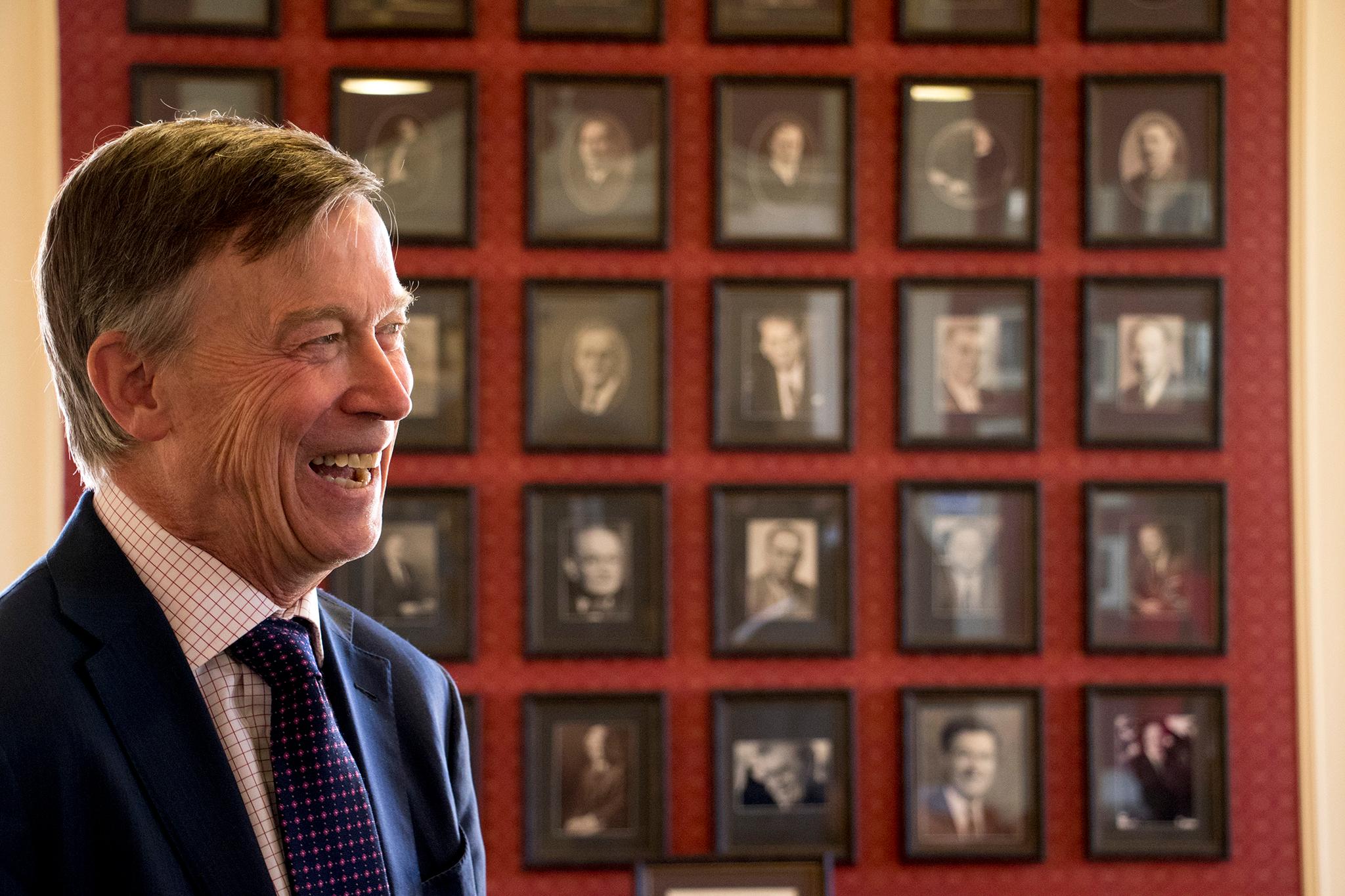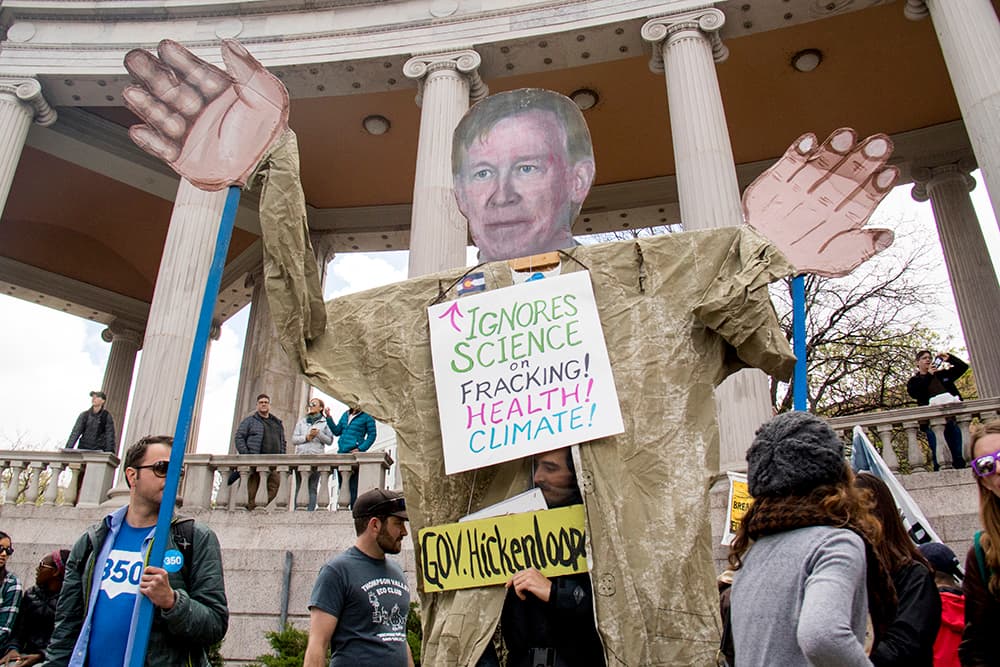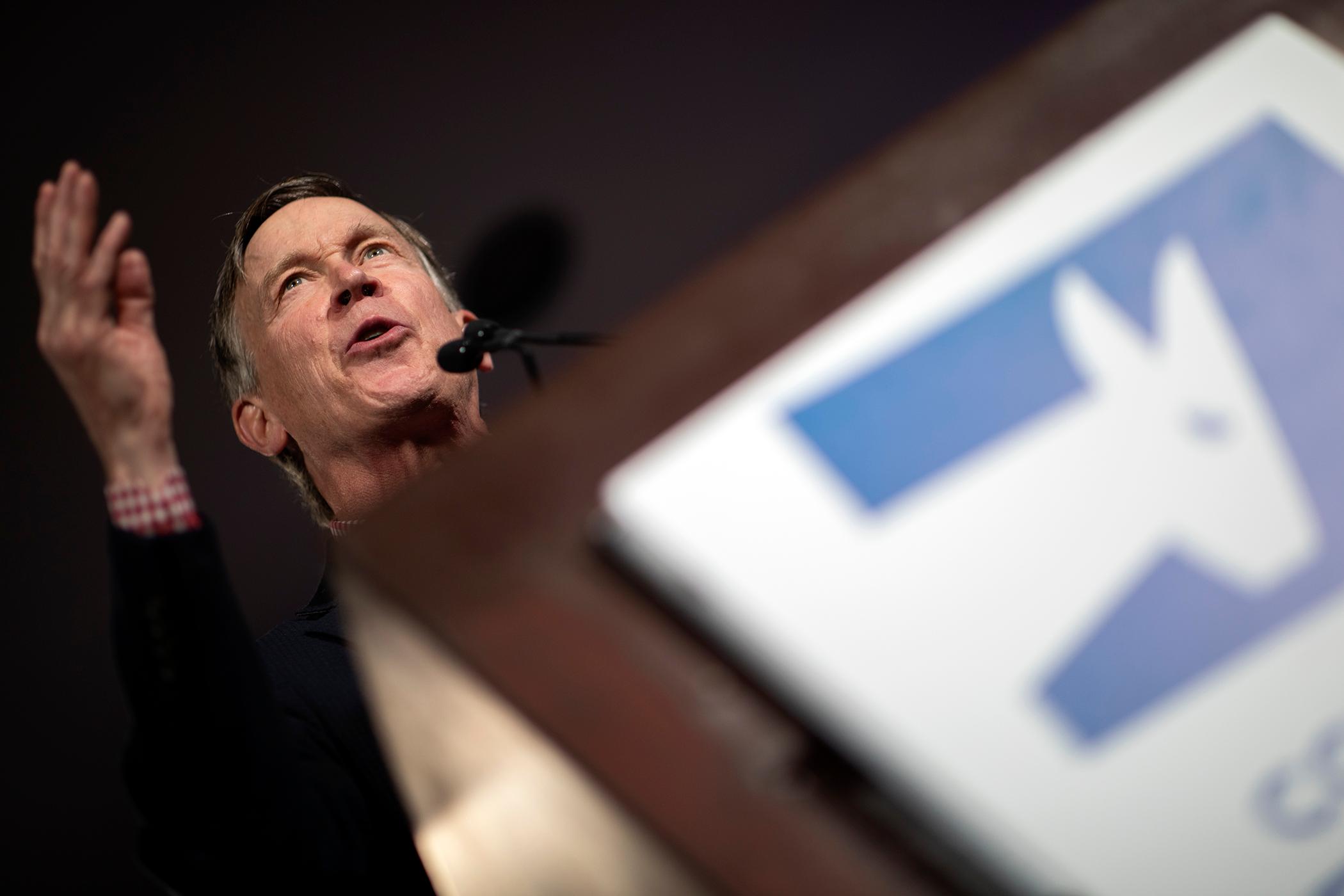Giddy up, folks.
Former Colorado governor John Hickenlooper has announced he's running for president, ending months of speculation over when he would announce he's running for president.
"I've proven again and again I can bring people together to produce the progressive change Washington has failed to deliver," Hickenlooper said in a campaign video announcing his candidacy on Monday. The video includes extensive shots of Denver, where Hickenlooper served as a mayor for eight years.
He is scheduled to appear on Good Morning America in a taped segment scheduled to air at 6:30 a.m. He'll be in Colorado this week for a send-off event scheduled for Thursday at the Greek Amphitheater at Civic Center Park in Denver. The event will include a performance by Nathaniel Rateliff and the Night Sweats. After the rally, he's planning on heading east to Iowa for a two-day tour. He'll finish up the weekend with an interview with BuzzFeed at SXSW
Hickenlooper joins a crowded Democratic field (NYT's list / Atlantic's cheat sheet) brimming with high-profile names including U.S. Sens. Kamala Harris, Bernie Sanders, Elizabeth Warren and Cory Booker -- and maybe even Colorado's own Sen. Michael Bennet.
Conventional wisdom is that he'll be vying for the role of most electable moderate.
"If nothing else, he's different," University of Denver professor Seth Masket said. "I think related to this centrist persona is a fairly easygoing persona. He's very reluctant to go negative in a campaign. It's a point of pride to him to have lots of friends and have very few enemies."
He will need to introduce himself to a national audience -- beyond house parties in New Hampshire and TV dates with John Kasich -- and grow his national profile to have any shot of outlasting his fellow Democrats. He's already been introducing himself as a doer, as someone who can get things done in a historically purple state.
Masket adds he'll have to make sure he speaks to advocates and donors to sell them on his winning formula.
"Right away, his best selling point would be as an experienced governor," Masket said. "It's a very big Democratic field right now but it's very Congress-heavy ... the fact that he did eight years as chief executive, that would give him some credibility. The fact that he won two elections in a purple state in years that weren't very easy for Democrats to win, those all speak pretty well for him."
He'll have to stay cool/electable/likable under more pressure than he's faced before.
That easygoing persona might make it tricky for President Donald Trump to find a nickname for Hickenlooper (our money is on some variation of "goofy"). Imagine a presidential debate between the two: Trump pointing at Hickenlooper -- a man so against negative campaigning, he based an ad off of it -- baiting him to say something totally not easygoing.
Would it work on Hickenlooper? Could we see him square up on national television?
"We haven't really seen him do that in campaigns so far," Masket said.
He'll probably tout that he works with both parties.
Hickenlooper would be a good foil for something Trump doesn't do well: working with people from both sides of the aisle.
"To the extent that people are looking for something different, that's something Hickenlooper can run on," Masket said. "It could certainly get him some attention and a couple of voters."
He'll probably point to economic growth in Denver and Colorado.
Hickenlooper gets a lot of credit for Colorado's economic boom, one that made it the envy of other states and turned it into a model of economic stability. The former mayor of Denver has a business background, famously opening a brewery after he was laid off from a job in geology. He was known for helping modify regulations that ended up benefitting both the government and businesses.
In an interview with Denverite shortly before leaving office, Hickenlooper said if he chose to run he would open his campaign office in Denver. Hickenlooper served two terms as Denver Mayor and currently lives in the city's Park Hill neighborhood.


And if and when his profile rises, he'll have to answer (or effectively dodge) questions about things that Colorado already knows about.
While Hickenlooper left office with strong approval ratings and a reputation for being an affable dude, no politician is without his detractors. He's currently facing a state ethics investigation probing whether he violated state laws when he accepted free lodging and travel. He was subject to scrutiny over the handling of convicted killer Nathan Dunlap's death sentence, choosing to punt it to a future governor instead of choosing whether to convert Dunlap's sentence to a life sentence. His relationship with the oil and gas industry and his support for the controversial practice of fracking could be a hard drink to swallow for some Democrats.
There's another potential factor standing in his way. Masket said there might not be a lot of enthusiasm in the Democratic base for "being a Western white guy."
Here are three things to watch for right away.
Who's endorsing Hickenlooper?
Masket points out something else to look out for is seeing which prominent, national Democrats endorse him. Might fellow governors endorse him? Will he get endorsements from other Coloradans? Can he get endorsements from members of Congress who'll have plenty of Capitol Hill colleagues to choose from?
Alan Salazar, Hickenlooper's former chief strategy officer, noted Gallup's poll in mid-February showing Trump's approval rating improving after the longest government shutdown in U.S. history. It was based on polling completed the first week of February.
"I think Democrats, progressive Democrats included, look at that, and have to be sobered by the possibility that if we don't nominate the right person, it's possible Trump could once again pull out an electoral victory," Salazar said. "In my mind, a candidate like John Hickenlooper is the kind of person Democrats ought to consider."
Can he raise money nationally?
When Hickenlooper formed his Giddy Up PAC, he got a lot of donations from within the state.
Since launching in September, federal records show, the Giddy Up PAC has raised roughly $600,000 through 2018. Slightly more than 50 percent of that money has been raised by individual contributions from donors in Colorado. A majority of the contributions came in the same month the PAC launched.
The PAC has an annual $5,000 limit on donations from individuals. That's why it's the highest number you'll find under "Suggested Contributions" at fundraising invitations for Giddy Up, like the one hosted Feb. 7 in New York to celebrate Hick's birthday. The PAC raised $8,500 in its first day of existence, which all came from Colorado. Among the donors are Hickenlooper himself, who's so far contributed just over $900 to his own PAC, and his wife Robin, who made the maximum $5,000 donation on Sept. 27.
Hickenlooper's PAC has received more than $160,000 from ActBlue, itself a Democratic PAC. Last year, ActBlue helped rake in $1.2 billion in fundraising, according to OpenSecrets.
Attracting major donors will involve convincing them of his electability, Masket said. He'll have to outline his stance on the issues he cares about most without alienating some donors (which Masket said could be a hard sell when it comes to environmental issues, given his track record).
Democratic consultant Steve Welchert said the obvious: Fundraising separates the A-teams from the B-teams.
"That's the hurdle most candidates can't overcome, the fundraising hurdle," Welchert said.
It will be pivotal for Hickenlooper to bring someone on board with "national fundraising credentials" who can help build email lists and put together meetings with people who can provide money for his campaign. Those lists are pretty important; Welchert points out this is how U.S. Sen. Bernie Sanders was able to haul in $6 million a day after announcing his candidacy. He had a ready-made list from his previous run, while Hickenlooper will need to start from scratch.
"Because it's such a crowded field, it's a really tough task," Welchert said.
In 2016, Hickenlooper finished in the final four of the Hillary Clinton veepstakes.
It was said to be close, with him visiting Clinton's home in the days before she announced Sen. Tim Kaine of Virginia would be her running mate.
Salazar wasn't involved in the decision-making process, but he knows Hickenlooper was seriously considered. Salazar, who left Hickenlooper's administration in May 2016 to work for Clinton's campaign, said Hickenlooper was interviewed by Clinton during her June 2016 stop in Denver. The two met at the Four Seasons Hotel Denver. Salazar said he was on a bus in New York when he got a call from a giddy Hickenlooper telling him the news.
"You would have to be braindead not to be excited," Salazar said. Hickenlooper was vetted and interviewed, though Clinton's camp ended up choosing Kaine. "I think he would have helped in ways that Senator Kaine did not," Salazar said.


Clinton's eventual pick may have pointed to Virginia as a more challenging battleground state than Colorado. Or in Salazar's words, Hickenlooper's state "seemed to be in the bag." In the end, Clinton's margin of victory in Colorado was slightly closer than in Virginia.
Is he running for vice president this time?
Welchert thinks that's unlikely. "That's not why John's running. I can't imagine that's the case," he said.
He also said nobody really "runs" for veep, they're usually hand-picked. Though he does think it's likely the eventual vice presidential candidate will come from the current crop of presidential candidates (except for Hickenlooper).
Finally, not to be a downer, but when Colorado politicians run for president...
...it hasn't worked out.
With his announcement, Hickenlooper becomes the most high profile presidential candidate (in serious contention) from Colorado since former U.S. Sen. Gary Hart. Hart seemed like a lock to win the Democratic nomination before an affair derailed his chances in 1987. Maybe you've seen the Hugh Jackman movie about it?
U.S. Rep. Patricia Schroeder of Denver considered running during the same cycle. Her aspirations didn't end well either. She ended up announcing her candidacy wasn't viable during a speech later lampooned by SNL (and they made fun of Hart, too).
More recently, former Congressman Tom Tancredo sought the Republican nomination for the 2008 election. He formally declared in April 2007, emerged as a national voice for anti-illegal immigration, participated in some debates and then dropped his bid by December 2007.












